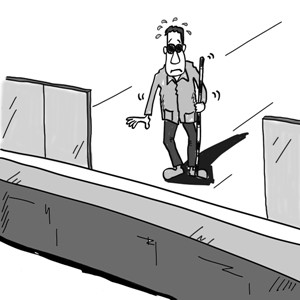
Illustration: Chen Xia/GT
A blind man fell from the platform at the Shanghai Railway Station on metro Line 4 and onto the tracks last month. Although two waiting passengers came to the rescue and pulled him to safety before the arrival of the train, he suffered severe internal injuries and had to undergo surgery.
The metro company later paid 30,000 yuan ($4,896) in compensation to the man in what it called a humanitarian gesture, but refused to accept any legal liability for the incident.
Whether or not the metro company is responsible in this case, which is for the court to decide, this tragedy emphasizes the importance of ensuring that all subway stations are equipped with protective measures and access facilities for those with visual and mobility impairment.
For the visually impaired, navigating around Shanghai's subway system is a daunting task. Although Shanghai is proud of its status as an international metropolis, barrier-free access facilities are either lacking or not functioning in many subway stations.
I have noticed that much of the tactile paving in subway stations are blocked by barriers, warning signs and even the security check scanners; and although almost every station has an elevator, some of them are frequently out of order, leaving blind people to grapple with the stairs or escalators.
In addition, almost none of the signs and announcements in the subway are in Braille, meaning it is hard for the visually impaired to stay informed of disruptions to services due to construction work.
Transferring is even more difficult. A Youth Daily reporter found last September that most transfer stations had no tactile paving to lead between platforms, and concluded that it was almost impossible for the visually impaired to transfer from one line to another in Shanghai.
Improvement would not take much - in Beijing, the escalators are signposted in Braille so the visually impaired know which direction they're going, while the companions of visually impaired people can travel for free.
The metro authority officials should spend the day trying to navigate the metro system blindfolded so they can appreciate the difficulties the visually impaired constantly face. This would also highlight the importance of training metro staff in how to aid the visually impaired. At present, such training seems to be woefully inadequate, as illustrated by the case last October of a quarrel between a blind couple and staff at Wenshui Road Station on Line 1, details of which were posted on Sina Weibo.

Copyright ©1999-2011 Chinanews.com. All rights reserved.
Reproduction in whole or in part without permission is prohibited.